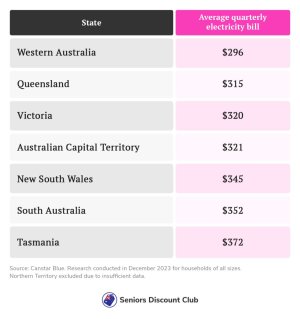Slash your energy bills by learning about these energy-hungry appliances in your home!
- Replies 9
In the face of soaring electricity prices, it's more important than ever to understand where your energy dollars are going.
While you might be aware of the usual suspects (yes, we're talking about you, air conditioning), you might be surprised to learn just how much power they consume.
In this comprehensive guide, we'll delve into the top household appliances that could be inflating your power bill, and share expert tips on how to use them more efficiently to help trim your energy costs.
Understanding Your Electricity Bill: An Australian Perspective
Before we dive into the energy-guzzling appliances, let's first understand the average electricity bill in Australia.
A survey conducted by financial comparison site Canstar Blue, involving more than 4,100 households, revealed the average quarterly electricity bills across the states and territories.

However, it's important to note that the cost of electricity in Australia can vary significantly depending on location, consumption, and energy providers.
Here's the state-by-state breakdown, ranked from cheapest to the most expensive:

The Energy Guzzlers in Your Home
So, which appliances are responsible for these hefty bills?
Let's take a look at the parts of your home that consume the most power, so you can identify potential areas for savings.
The data was obtained from the Department of Climate Change, Energy, Environment and Water (DCCEEW), and the SA Department of Energy and Mining.
How to Calculate the Running Cost of an Appliance
Understanding the running cost of an appliance can help you make more informed decisions about its usage. The Commonwealth Scientific and Industrial Research Organisation (CSIRO) has a handy set of instructions you can follow to do this yourself.
While we’re on the topic of energy saving habits, you might want to check out these everyday habits that could be costing you an extra $670 unknowingly.

Do you have any energy-saving tricks of your own? Share them with us in the comments below!
While you might be aware of the usual suspects (yes, we're talking about you, air conditioning), you might be surprised to learn just how much power they consume.
In this comprehensive guide, we'll delve into the top household appliances that could be inflating your power bill, and share expert tips on how to use them more efficiently to help trim your energy costs.
Understanding Your Electricity Bill: An Australian Perspective
Before we dive into the energy-guzzling appliances, let's first understand the average electricity bill in Australia.
A survey conducted by financial comparison site Canstar Blue, involving more than 4,100 households, revealed the average quarterly electricity bills across the states and territories.

The average quarterly electricity bills in Australia vary by state, with Western Australia having the lowest average at $296 and Tasmania the highest at $372 Credits: Shutterstock
However, it's important to note that the cost of electricity in Australia can vary significantly depending on location, consumption, and energy providers.
Here's the state-by-state breakdown, ranked from cheapest to the most expensive:

The Energy Guzzlers in Your Home
So, which appliances are responsible for these hefty bills?
Let's take a look at the parts of your home that consume the most power, so you can identify potential areas for savings.
The data was obtained from the Department of Climate Change, Energy, Environment and Water (DCCEEW), and the SA Department of Energy and Mining.
- Heating/Cooling—40 per cent: It's no surprise that heating and cooling top the list. We're all guilty of cranking up the air conditioner when it's sweltering, and the heater when it's freezing. However, there are ways to manage these costs. For instance, consider using a fan before switching on the air conditioner, which is cheap to run at only around 2 cents per hour. If you must use the air conditioner, try to set the temperature between 23 and 26 degrees Celsius. Each degree below this can increase your electricity bill by as much as 15 per cent, according to the Energy Efficiency Council.
- Hot Water—25 per cent: Showers, toilets, washing machines, inside taps, bath tubs, and dishwashers all contribute to your hot water consumption. To reduce your hot water usage, consider having shorter showers and installing a low-flow shower head. Replacing your old hot water system with a more efficient model could also reduce your running costs.
- Electronics—14 per cent: This includes appliances and devices such as TVs, computers, gaming consoles, music and entertainment systems, and home office equipment. Most electronic appliances tend to enter a stand-by mode rather than fully powering down, which can cost you up to 10 per cent of your electricity bill each year. To save on stand-by costs, make a habit of switching devices off at the wall when you're not using them.
- Fridge and Freezers—8 per cent: The fridge is one of those appliances that you have no choice but to run 24/7. Choosing the right size and efficiency for your requirements can make all the difference to your energy bill.
- Cooking Appliances—5 per cent: From the refrigerator and freezer to the dishwasher, coffee machine and oven, all of these appliances use energy to run. For small one or two-person households, it may be more cost effective to use benchtop appliances such as an air fryer or microwave rather than an oven or cooktop.
- Laundry—4 per cent: How much energy it will cost to run a washing machine and dryer will come down to the size and type. When it comes to washing, the simplest tip is to choose a cold wash. The Department of Energy says washing clothes with cold water 'can save up to 10 times more energy' than a warm wash.
How to Calculate the Running Cost of an Appliance
Understanding the running cost of an appliance can help you make more informed decisions about its usage. The Commonwealth Scientific and Industrial Research Organisation (CSIRO) has a handy set of instructions you can follow to do this yourself.
- Find the wattage: The wattage is usually printed on the actual appliance or on the packaging. To turn your wattage into kilowatts just divide by 1,000.
- Calculate the cost: You first need to work out the kilowatt hours (kWh) consumed for that period. So, multiply your kW by the length of time, in hours, that the appliance is being used for. Then multiply this by $0.22 (retailers' tariffs will differ so just use this as a guide). This will give you the running cost. For example, if you used your 3kW air conditioner for four hours, that's three multiplied by four, which works out to be 12kWh. Now multiply that number by 0.22 and you'll get 2.64. That means it costs $2.64 to run, or $0.66 an hour.
While we’re on the topic of energy saving habits, you might want to check out these everyday habits that could be costing you an extra $670 unknowingly.
Key Takeaways
- The average quarterly electricity bills in Australia vary by state, with Western Australia having the lowest average at $296 and Tasmania the highest at $372.
- Heating/cooling is the biggest energy user in homes at 40 per cent, with tips to reduce usage including setting temperature efficiently and using fans to circulate air.
- Stand-by power can cost up to 10 per cent of an electricity bill annually, so it's recommended to switch off appliances at the wall when not in use.
- Simple adjustments like using cold water for washing, a low-flow showerhead, and ensuring fridges and freezers are well-maintained can significantly cut down energy consumption and costs.
Do you have any energy-saving tricks of your own? Share them with us in the comments below!
Last edited by a moderator:







